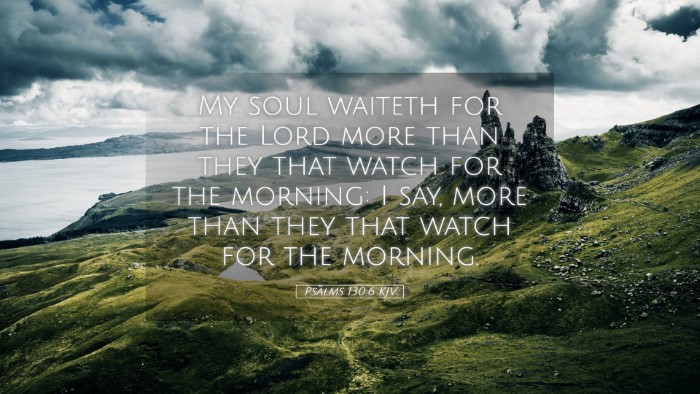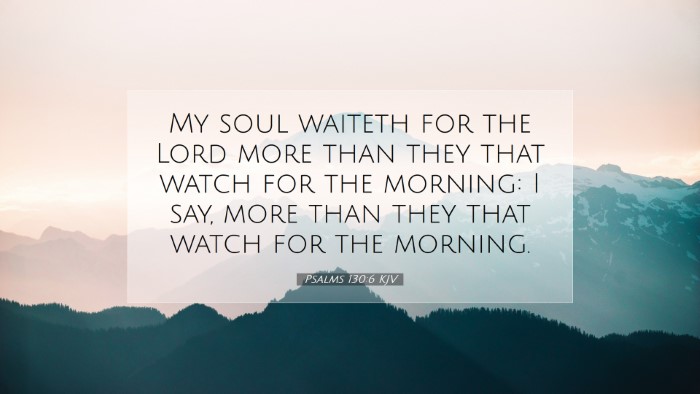Psalms 130:6 Commentary
Psalms 130:6 states: "My soul waits for the Lord more than watchmen wait for the morning, more than watchmen wait for the morning."
This poignant verse encapsulates a deep yearning for divine intervention and illustrates the essence of patient expectation in faith.
Exegesis of Psalms 130:6
This verse stands at the heart of a penitential psalm that expresses feelings of despair, hope, and longing for God's mercy. The psalmist emphasizes the concept of waiting,
a theme that recurs throughout scripture, denoting a posture of humility and reliance upon God.
The phrase "my soul waits for the Lord" reflects a personal and intimate connection with the divine. It suggests not just a passive wait but an active one,
infused with hope and trust in God's promises.
Insights from Matthew Henry
Matthew Henry, in his commentary, highlights the significance of the nighttime experience of the watchmen. He notes that their counting of the hours until dawn symbolizes
the deep longing for consolation that the psalmist feels. The relentless waiting of the watchmen serves as a metaphor for the believer's anticipation of God's timely deliverance.
He elaborates that this anticipation is not based on the whims of human emotions but on the faithfulness of God. Just as the watchmen await the break of day,
so too does the believer await God's justice and mercy, which will surely come.
Reflections from Albert Barnes
Albert Barnes echoes the sentiment of waiting expressed in Psalms 130:6, stating that the longing for God parallels the yearning that watchmen have for the dawn.
He posits that this verse illustrates the degree of earnestness and intensity with which the psalmist seeks divine presence and intervention.
Barnes further elaborates that the repeated phrase "more than watchmen wait for the morning" serves to amplify the depth of this yearning. It signifies an
urgency that encapsulates both physical and spiritual longing—reflecting how fiercely one should pursue a relationship with God amidst despair.
Contributions from Adam Clarke
Adam Clarke provides a nuanced perspective by interpreting the role of the watchmen in the context of their vigilance against adversaries. He draws parallels between
the spiritual warfare believers face and the necessity of such unwavering watchfulness.
Clarke asserts that the repetitive nature of the phrase regarding watchmen serves to reinforce the idea that true faith requires persistence and sustained focus on God's
forthcoming grace. He encourages readers to recognize the strength found in waiting on the Lord—an act that empowers believers to endure trials with hope.
Thematic Implications for Believers
Psalms 130:6 urges believers to cultivate a heart of patience and anticipation. The persistent longing for the Lord reflects a deep-seated faith that acknowledges human
limitations while trusting in divine provision.
-
Waiting as a Spiritual Discipline: The psalmist's waiting is a model for believers today, emphasizing the necessity of patience in a fast-paced world.
Such waiting is active; it requires prayer, meditation, and reflection on God's faithfulness.
-
Hope Amid Despair: In dire circumstances, this verse serves as a reminder that hope is anchored in God. The watchmen's expectation of dawn parallels the
believer's expectation of God's promises, encouraging resilience.
-
The Urgency of Spiritual Vigilance: Like watchmen, Christians are called to remain vigilant in their faith. Persistence in prayer and an unwavering focus on God
are essential aspects of spiritual maturity.
Conclusion
Psalms 130:6 encapsulates a profound spiritual truth—waiting on the Lord embodies both longing and trust. The insights from commentators such as Matthew Henry,
Albert Barnes, and Adam Clarke deepen our understanding of this verse, illustrating how the imagery of watchmen enhances the theme of waiting with expectation.
For pastors, students, theologians, and Bible scholars, this verse serves as a rich source for contemplating the interplay of hope, patience, and faith in the life of a believer.
It challenges us to reflect on our posture before God, urging us to wait eagerly and steadfastly for His presence and deliverance in all circumstances.


